Diwali, the festival of lights, is one of the biggest celebrations in Indian culture. The 5-day long festival signifies the victory of light over darkness, good over evil, and knowledge over ignorance. Diwali celebrations are characterized by lighting lamps and candles, offering prayers, exchanging gifts, cleaning and decorating homes, making rangolis, and partaking in family feasts.
An important part of Diwali preparations is adorning homes with beautiful flowers and floral arrangements. Flowers hold great significance in Hindu rituals and festivals. Different blooms are associated with different deities and occasions. Flowers are an integral part of Laxmi Pujan, the main day of Diwali when Goddess Laxmi, the goddess of wealth, prosperity and good fortune is worshipped.
Here is a look at some of the most popular Diwali flowers and how to incorporate them into your celebrations:
Lotus

The radiant pink and white lotus flower is strongly associated with Diwali. Lotus symbolizes purity, beauty, divinity, fertility, wealth, knowledge and tranquility. Goddess Laxmi and Lord Vishnu are often depicted as seated on a lotus flower.
- On Diwali, lotus flowers are used to perform Laxmi puja. Place a lotus flower along with coins in a thali and invoke Laxmi by circling the thali in front of the Goddess’ idol or image.
- Lotus flowers are also used to make floral rangolis at the entrance to homes to signify welcoming Goddess Laxmi.
- Pink and white lotus flowers can be arranged in a vase or bowl to use as part of the Diwali decor. They make for an elegant and meaningful floral arrangement.
- Lotus stems are sometimes used in Torans or doorway garlands in homes to signify auspiciousness.
Where to Source Lotus:
- Look for lotus flowers at local flower markets or ask your regular florist to source them.
- Many flower shops provide readymade lotus rangolis or sell loose lotus petals and leaves that can be used to make DIY floral rangolis at home.
Marigolds
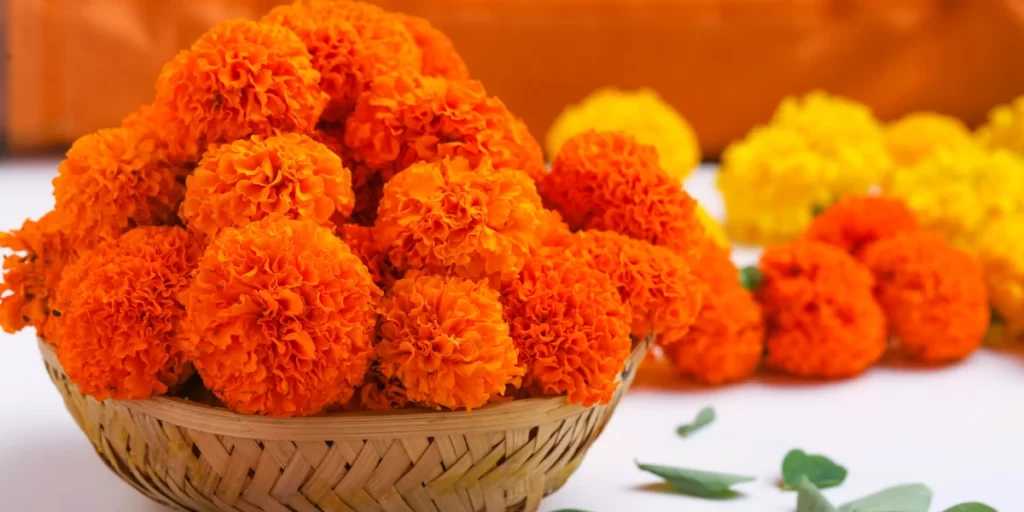
Bright orange and yellow marigolds are called ‘genda’ or ‘ganesha-phool’ in Hindi. They are associated with prosperity and considered auspicious for Diwali.
- Marigolds are used in floral decorations and to make flower rangolis at home.
- Marigold garlands are hung at doors and entrances on Diwali. They are believed to shower wealth and ward off evil.
- Marigolds are offered to Goddess Laxmi during puja rituals.
- These cheery blooms are also used in Diwali flower arrangements like flower bowls and vases.
Where to Source Marigolds:
- Marigolds are easily available at local flower markets year-round. Pick bright, fully bloomed flowers.
- You can also buy marigold flower strands and readymade garlands from flower sellers and online florists.
Mogra
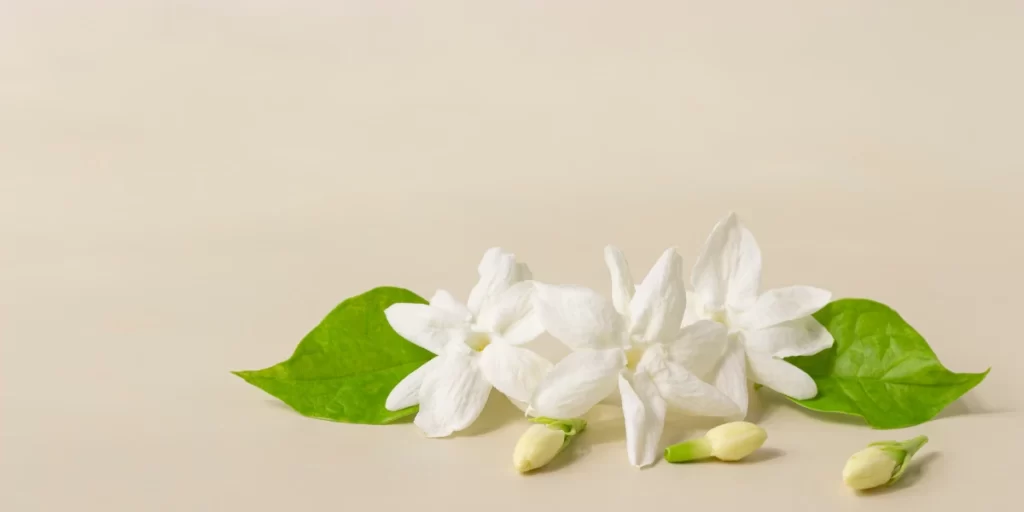
The sweetly fragrant mogra flower or Arabian jasmine is used extensively to make flower garlands, gajras and venis for Diwali.
- Mogra garlands are traditionally exchanged between friends and families.
- Brides wear mogra venis or bracelets on their wrists during Diwali celebrations.
- Mogra flowers are often woven into Torans or garlands that are hung at front doors of homes as a sign of welcome.
- Their sweet scent is considered to usher in positivity.
Where to Source Mogra:
- Mogra garlands and venis can be bought from local flower sellers, street vendors and online florists.
- You can also buy loose mogra flowers by weight to make DIY gajras and venis.
Roses
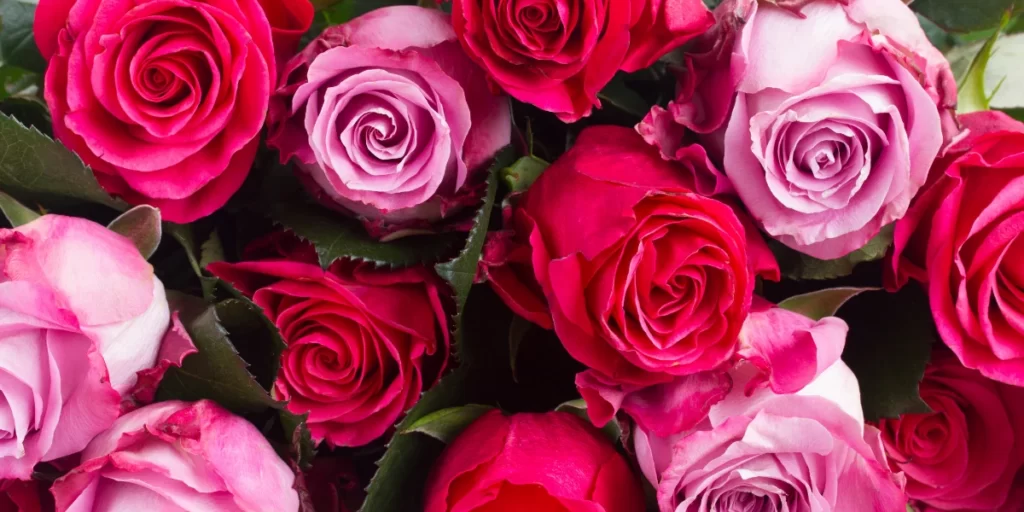
Rose flowers are associated with the Goddess Laxmi. Their bright colors and fragrance are thought to bring in joy and prosperity.
- Pink and red roses are offered to Laxmi during Diwali puja. Petals are sometimes showered over the Goddess’ idol or image.
- Roses are used in floral rangolis made to welcome guests on Diwali. Their vibrant hues add to the festive beauty.
- Bouquets or arrangements of roses make for gorgeous Diwali decor for homes. Red and pink roses displayed in decorative vases or bowls uplift the Diwali aesthetics.
Where to Source Roses:
- Most flower shops and supermarkets stock rose flowers. Pick freshly cut, bright blooms.
- Order readymade rose bouquets online from florists or DIY rose arrangements using loose rose buds.
Orchids
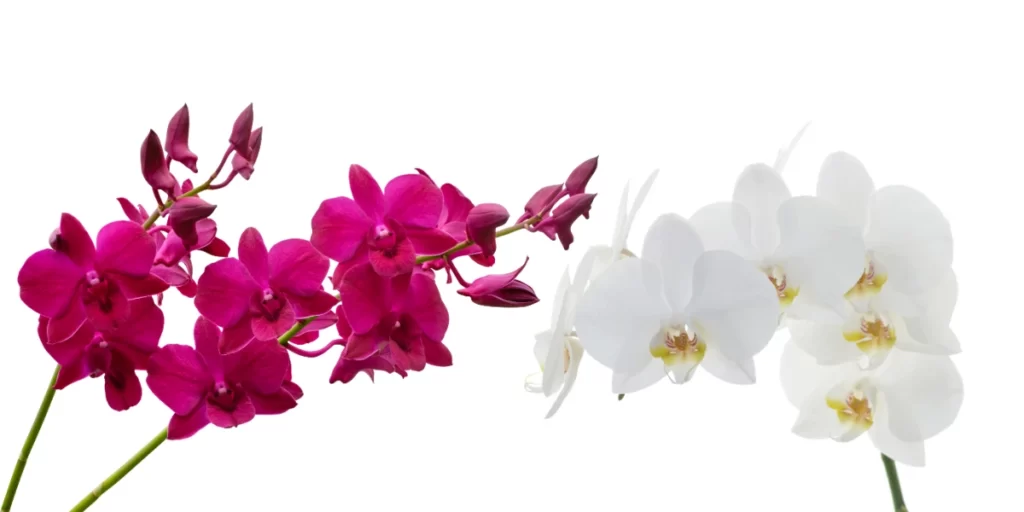
The delicate and elegant orchid flower is also associated with Diwali celebrations.
- White and purple orchids are prominently used in flower arrangements for homes and office spaces during Diwali.
- Orchids are considered an auspicious flower and their graceful beauty is thought to spread harmony.
- Place orchid plants on either side of entrances or in the puja room. Some also offer orchid blooms to Goddess Laxmi.
Where to Source Orchids:
- Orchids are available at most nurseries and flower shops. Pick plants with healthy leaves and bright blooms.
- Buy cut orchids to make flower arrangements or order readymade orchid flower baskets online.
Chrysanthemums
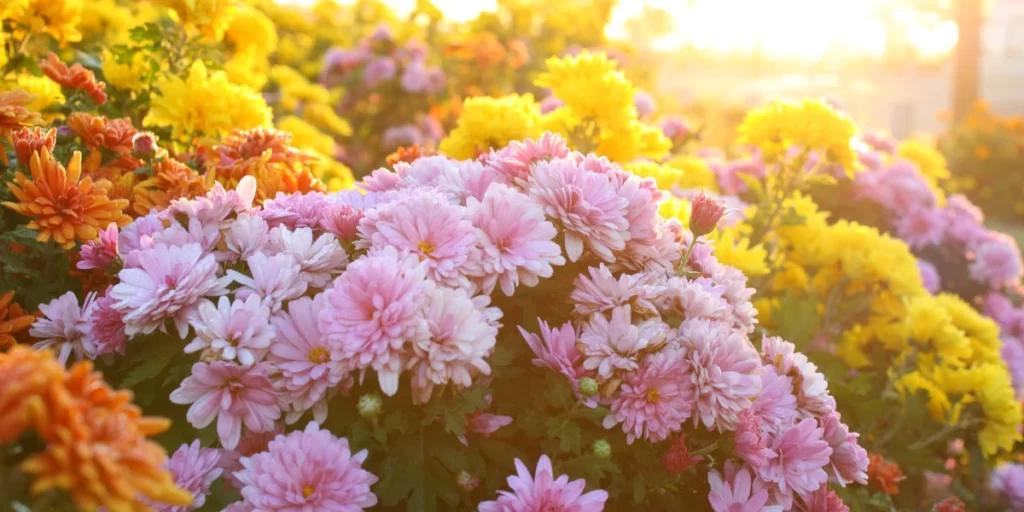
Chrysanthemums or ‘gul-daudi’ are known as the flowers of joy and laughter. Their blooms signify the Diwali spirit of fun and togetherness.
- Brightly colored chrysanthemums are used in floral decorations around Diwali. They are considered auspicious.
- Chrysanthemums are sometimes used along with marigolds to make Diwali rangolis.
- Add potted chrysanthemums to your Diwali decor for an extra pop of color and vitality.
Where to Source Chrysanthemums:
- Chrysanthemum plants with flowers are available at most nurseries and flower shops before Diwali.
- Buy professionally arranged chrysanthemum flowers or make DIY arrangements using cut blooms.
Other Diwali Flowers
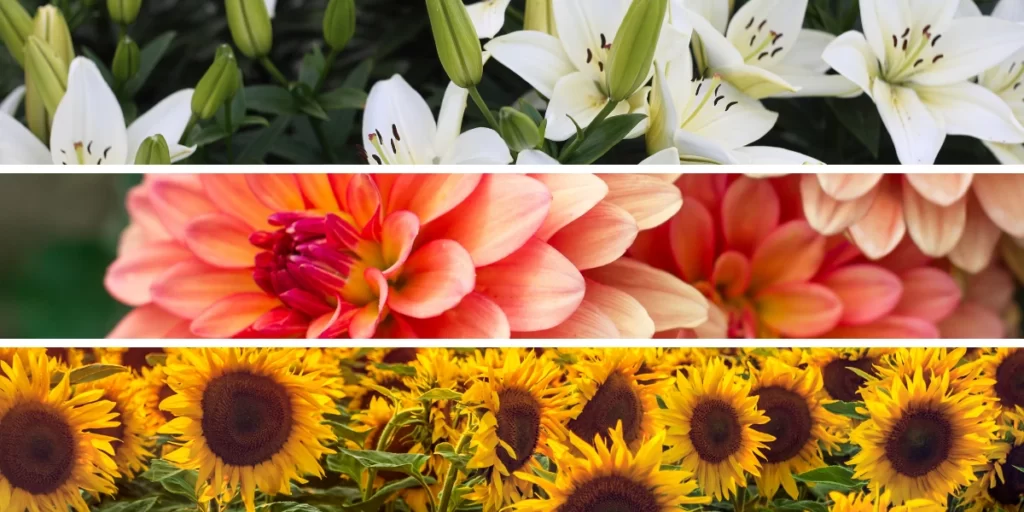
Some other flowers that are used during Diwali celebrations include:
- Lilies – Associated with Lakshmi puja. White and pink lilies signify purity, prosperity, and tranquility.
- Carnations – Used in floral decorations. Signify a bond of love.
- Daisies – signify new beginnings. Used in flower rangolis.
- Sunflowers – Signify vibrance, warmth, and positivity. Used in flower arrangements.
- Dahlias – Signify inner strength. Used in tabletop decor.
- Gladioli – Represent infatuation and sincerity. Used in gardens and entrances.
Tips for Using Flowers on Diwali
- Source flowers from sellers to ensure freshness and variety.
- Pick fully bloomed, vibrant flowers free from blemishes.
- Choose flowers according to their significance and your purpose.
- Mix and match flowers of complementary hues for rangolis and decor.
- Use flowers native to your region for ease of sourcing.
- Make flower arrangements 1-2 days in advance and refrigerate to prolong vase life.
- Change water and re-cut stems regularly for long-lasting arrangements.
- Sprinkle flower petals around entrances, paths, and puja rooms.
- Preserve and dry flowers after puja to use for next year’s decor.
Conclusion
Flowers are an incredible way to channel the Diwali spirit of joy, prosperity, and positivity. Selecting flowers like lotus, marigolds, roses, mogra, orchids, lilies, and more according to their significance adds meaning and beauty to your Diwali celebrations. Source locally available blooms and combine traditional favorites with modern floral decor ideas for a gorgeous Diwali. The floral fragrances, vivid hues, and spiritual associations will make your festival of lights even more magnificent.
FAQs About Diwali Flowers
What flowers are used on Diwali?
 Some popular Diwali flowers include lotus, marigolds, mogra, roses, orchids, lilies, chrysanthemums, carnations, daisies, sunflowers, and more.
Some popular Diwali flowers include lotus, marigolds, mogra, roses, orchids, lilies, chrysanthemums, carnations, daisies, sunflowers, and more.How are flowers used on Diwali?
Flowers are used for rangolis, torans, decorations, puja offerings, and arrangements. They are made into garlands, venis, and gajras.
What do flowers symbolize on Diwali?
Flowers symbolize auspiciousness, prosperity, knowledge, purity, and positivity. Different flowers signify different attributes of the gods and goddesses worshipped.
Where can I buy Diwali flowers?
You can source Diwali flowers from local flower markets, street vendors, supermarkets, online florists, nurseries, or your regular neighborhood florist.
What flowers should I avoid on Diwali?
Avoid using inauspicious or wilting flowers. Some also avoid tulips and poppies during Diwali. Stick to fresh, brightly colored blooms associated with the festival.

 Some popular Diwali flowers include lotus, marigolds, mogra, roses, orchids, lilies, chrysanthemums, carnations, daisies, sunflowers, and more.
Some popular Diwali flowers include lotus, marigolds, mogra, roses, orchids, lilies, chrysanthemums, carnations, daisies, sunflowers, and more.
1 thought on “These Diwali Flowers Are So Much More Than Meets the Eye – Find Out Why!”